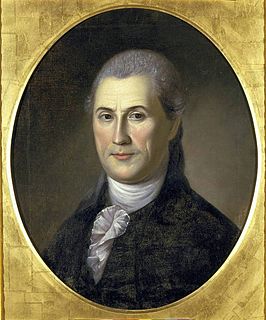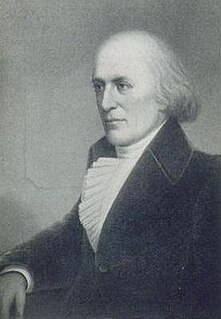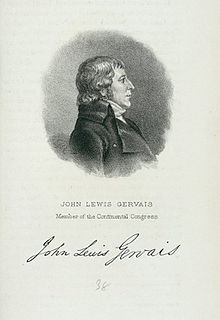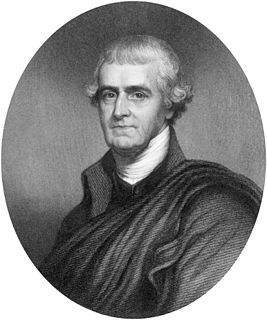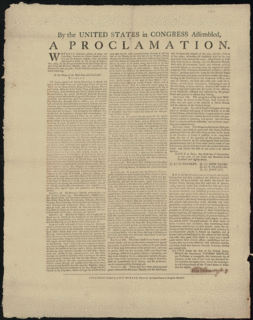This article needs additional citations for verification .(June 2016) (Learn how and when to remove this template message) |
Richard Beresford (June 3, 1755 – February 6, 1803) was an American planter and lawyer from Berkeley County, South Carolina. He was a delegate for South Carolina in the Confederation Congress in 1783 and 1784.
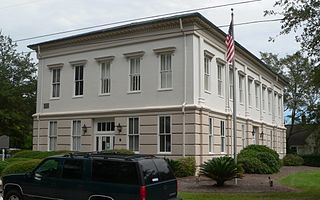
Berkeley County is a county in the U.S. state of South Carolina. As of the 2010 census, its population was 177,843. Its county seat is Moncks Corner. After two previous incarnations of Berkeley County, the current county was created in 1882.
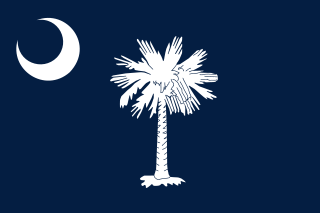
South Carolina is a state in the Southeastern United States and the easternmost of the Deep South. It is bordered to the north by North Carolina, to the southeast by the Atlantic Ocean, and to the southwest by Georgia across the Savannah River.
Beresford was born near Charleston, South Carolina and was baptized June 3, 1755. He was educated in South Carolina and in England, studying law at the Middle Temple in London. He became a lawyer in private practice and also engaged in planting, with extensive estates in Berkeley County and Colleton County in South Carolina as well as in England.

Charleston is the oldest and largest city in the U.S. state of South Carolina, the county seat of Charleston County, and the principal city in the Charleston–North Charleston–Summerville Metropolitan Statistical Area. The city lies just south of the geographical midpoint of South Carolina's coastline and is located on Charleston Harbor, an inlet of the Atlantic Ocean formed by the confluence of the Ashley, Cooper, and Wando rivers. Charleston had an estimated population of 134,875 in 2017. The estimated population of the Charleston metropolitan area, comprising Berkeley, Charleston, and Dorchester counties, was 761,155 residents in 2016, the third-largest in the state and the 78th-largest metropolitan statistical area in the United States.
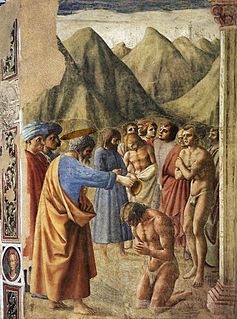
Baptism is a Christian rite of admission and adoption, almost invariably with the use of water, into Christianity. The synoptic gospels recount that John the Baptist baptised Jesus. Baptism is considered a sacrament in most churches, and as an ordinance in others. Baptism is also called christening, although some reserve the word "christening" for the baptism of infants. It has also given its name to the Baptist churches and denominations.

England is a country that is part of the United Kingdom. It shares land borders with Wales to the west and Scotland to the north-northwest. The Irish Sea lies west of England and the Celtic Sea lies to the southwest. England is separated from continental Europe by the North Sea to the east and the English Channel to the south. The country covers five-eighths of the island of Great Britain, which lies in the North Atlantic, and includes over 100 smaller islands, such as the Isles of Scilly and the Isle of Wight.
He took an active part in the American Revolutionary War, serving as an officer in the 1st South Carolina Regiment under General Isaac Huger in the Georgia campaign in 1778. He was captured at the fall of Charleston in 1780 and imprisoned at St. Augustine until 1781, when he was exchanged. He was member of the South Carolina state house of representatives, 1781 and was elected by the South Carolina state general assembly as a member of the privy council in 1782. He was elected the ninth Lieutenant Governor of South Carolina in January 1783, but resigned shortly afterward, having been elected to the Continental Congress. He was a member of the Confederation Congress in 1783 and 1784, after which he resumed planting. He later engaged in literary pursuits and published the Vigil in Charleston in 1798. He died in Charleston. [1]

The American Revolutionary War (1775–1783), also known as the American War of Independence, was an 18th-century war between Great Britain and its Thirteen Colonies which declared independence as the United States of America.
The 1st South Carolina Regiment was raised on June 6, 1775, at Charleston, South Carolina, for service with the Continental Army. The regiment saw action at the Siege of Savannah and the Siege of Charleston. The British Army captured the regiment at Charleston on May 12, 1780, together with the rest of the Southern Department.
Isaac Huger was a planter and Continental Army general during the American Revolutionary War.
The Confederation Congress had scheduled to meet at the Maryland State House in November, 1783, to ratify the Treaty of Paris ending the American Revolutionary War. However, by mid-January only seven of the thirteen states had sent delegates, which was not enough to ratify the treaty. On January 13, 1784, Beresford, who was ill, was the last delegate to arrive. Soon after his arrival, the vote was taken and on January 14, the Congress ratified the treaty.
The Treaty of Paris, signed in Paris by representatives of King George III of Great Britain and representatives of the United States of America on September 3, 1783, ended the American Revolutionary War. The treaty set the boundaries between the British Empire in North America and the United States, on lines "exceedingly generous" to the latter. Details included fishing rights and restoration of property and prisoners of war.

